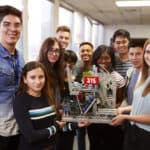Applying to College
New ACT changes
Following the lead of the recent SAT changes, ACT announced new changes going into effect starting in April 2025. The changes will first only apply to national online test dates in April 2025, then will be rolled out to hard copy tests in September 2025, and finally school-day tests in Spring 2026. Here’s a…
Read MoreCollege is not a costume party
Heading into application season, we liked the following advice from MIT admissions: “Some students feel so much pressure to get into the “right” college that they want to make sure they do everything right—down to their extracurricular activities. Fortunately, the only right answer is to do what’s right for you—not what you think is…
Read MoreHigh Point Looks to the Future
By CIT Consultant Lessa Scherrer “The “great disruption” in skills is underway. According to BCG and Emsi Burning Glass, over one-third of the top 20 skills in job postings for the average job has changed since 2016. … while technical skills remain highly valued, the top five most sought-after skills that employers are seeking today…
Read MoreList Building for LGBTQ+ Students: Living-Learning Communities, with CIT Consultant Stephanie George
To create an especially comfortable, safe, and hospitable environment for LGBTQ+ students, some colleges have created LGBTQ+ living-learning communities. I’ve written about the strong beneficial qualities of living-learning communities (LLCs) in other posts, but here I want to offer five great LGBTQ+ examples that offer particularly inclusive, gender-neutral environments with compelling academic and social opportunities. …
Read MoreMajor changes to the college process in 2024
This past year has resulted in some of the most significant changes to the college planning process in decades. Admission trends have changed how colleges admit students, there are substantial changes to the FAFSA and college financial aid that may make college more expensive for middle class and affluent families, but also provide attractive…
Read MoreWhat is ABET accreditation and does it matter?
Written by CIT Consultant Marit Lunstad I’m thinking about declaring engineering as my college major. . What is ABET accreditation, and why do I care? To what extent should accreditation factor into my decision making, as I construct my college list? Let’s begin with the question of what accreditation is. Accreditation is, essentially, a seal…
Read MoreEngineering Programs for B Students
Written by CIT Consultant Suzy Fallon Contrary to popular belief, not every future engineer has a 4.0 and a perfect ACT or SAT score! We know plenty of college students currently studying engineering who were solid B students in high school. As a whole, engineering is a competitive major regardless of your high school credentials. …
Read MoreLiberal Arts Colleges with Engineering Programs: Six to Consider
Written by CIT Consultant Tiffany Eggers Once a student has decided to become an engineer, the next significant choice is where to study. Course lists and major requirements are only part of what students should consider. Students are happiest with their decisions if they have carefully pondered the types of teaching and living environments in…
Read MoreEngineering Activities for High School Students
Written by CIT Consultant Paige Feldman Calling All Future Engineers! Hey everyone! I’m super excited to talk about something that’s close to my heart – the thrilling and ever-expanding world of engineering! Did you know engineering is not just about solving puzzles; it’s about paving the way to our future with innovation, creativity, and, of…
Read MoreFactoring Direct Entry vs. Pre-Engineering Into List Building for the Engineering Disciplines
Written by CIT Consultant Suzy Fallon Direct entry engineering, also known as direct-admit engineering, allows students to be admitted directly into an engineering program as a freshman. This means students don’t need to apply separately to an engineering program after completing general education requirements or prerequisites. Direct entry programs tend to be highly competitive and…
Read More









